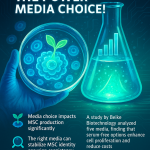💧 These innovations are designed to reduce product losses in bioprocessing.
📈 They aim to maximize output, ensuring more efficient production.
🔬 Improved techniques enhance productivity and cost-effectiveness.
🌱 Such advancements are crucial for industries relying on biopharmaceuticals and biotechnology.
🚀 Overall, these developments promise significant benefits to manufacturing processes.
Introduction:
This article discusses recent advancements in tangential flow filtration (TFF) technology, particularly its application in various biopharmaceutical processes. These innovations aim to enhance operational efficiency by reducing product losses and improving overall yield in the manufacturing process.
- Recent technological developments in TFF have significantly optimised bioprocessing, resulting in improved efficiencies.
- The advancements in membrane materials and designs have led to higher throughput and reduced fouling.
- Integration of real-time monitoring technologies facilitates better control of filtration processes, reducing the occurrence of product loss.
- Strategically designed TFF systems enable the processing of multiple product streams simultaneously, which streamlines production and increases output.
- Future directions focus on further automation in TFF processes and the implementation of artificial intelligence to enhance decision-making and operational management.
Conclusion:
The advancements in TFF are pivotal for the biopharmaceutical industry, as they address critical challenges related to product recovery and yield. As the field continues to evolve, the adoption of innovative technologies will likely revolutionise manufacturing processes, leading to more efficient production strategies and potentially lower costs for therapeutics.







